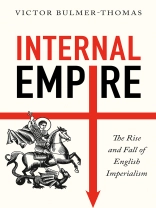Over several centuries, England imposed itself by force and by treaty on the other three nations of the Hiberno-British Isles to form its own English Empire. For much of its life, the United Kingdom has only endured out of shared interest in overseas territorial expansion–a British Empire built on slavery. In his new history, Victor Bulmer-Thomas charts the slow rise and rapid decline of English imperialism at home, from the tenth century to the present.
When independence movements in the colonies began challenging the British Empire, a Commonwealth was constructed to hold together both former imperial possessions–including the Irish Free State–and the four nations of the internal empire. The Commonwealth was later supplanted by the European Economic Community, but Europe’s potential as a long-term source of cohesion for the UK was dashed when the English voted to leave the EU in 2016, dragging the whole UK with them.
With Empire, Commonwealth and Europe all gone, British unity is more fragile than ever. Facing the prospect of an independent Scotland, a reunited Ireland and an increasingly autonomous Wales, England may yet have to acknowledge its forgotten history as an aggressive imperial force on Britain’s own, often unwilling, soil.
Circa l’autore
Victor Bulmer-Thomas is Honorary Professor in the Institute of the Americas, University College London. Between 2001 and 2006, he was the director of Chatham House. He is the author or editor of some thirty books, including, most recently,
Empire in Retreat: The Past, Present, and Future of the United States
.












